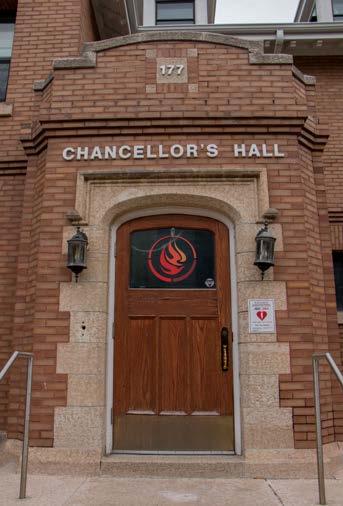
4 minute read
Research & Technology
New NCTR research director investing in reconciliation
UNDRIP expert hopes to set an international example
RESEARCH & TECHNOLOGY
Michael Campbell, staff Brenda Gunn, professor in the faculty of law, has been appointed to the position of academic and research director at the National Centre for Truth and Reconciliation (NCTR). Gunn started her five-year term with the NCTR on Sept. 1, 2021 after being promoted to full professor in the faculty of law earlier this year.
Gunn’s role as academic and research director is to provide leadership and oversight to researchers and to ensure that the collaborative research projects are conducted with respect and dignity to survivors.
“Part of my job is to continue to engage in research to meet those objectives of truth and reconciliation,” Gunn said.
“I really hope in this position that I have the ability to connect with and work with Indigenous communities and Indigenous peoples in Canada as well.”
Gunn also said she hopes to be able to reconnect with partner organizations to provide leadership and coordination on truth and reconciliation research and to establish international connections.
“Residential schools wasn’t just something that happened in Canada,” Gunn said.
“There are similar schooling type of situations in many countries with Indigenous peoples, some of whom are working through various Truth and Reconciliation-type processes.”
Gunn began her career as an assistant professor in the faculty of law in 2009. Her research has focused on implementing the United Nations Declaration on the Rights of Indigenous Peoples (UNDRIP) building up to the development of a handbook outlining UNDRIP and its relevance in Canada. Gunn has also delivered workshops, lectures and written articles about the implementation of UNDRIP in Canada as a reconciling mechanism.
“My research has focused more on the reconciliation aspect of truth and reconciliation,” Gunn said.
“I spend a lot of time at the [United Nations (UN)], in UN meetings. Both Indigenous-specific mechanisms, but also participating in […] Canada’s periodic reviews under various human rights treaties.”
The UN universal periodic review is a mechanism which involves a review of all member countries. Each country declares the actions that they have taken to remedy human rights abuses as outlined in various international treaties.
During the 2021 election campaign, the Liberal Party of Canada promised $60 million in funding for the NCTR. The bulk of the funding would go to the construction of a new home for the NCTR. Currently, the NCTR is located in Chancellor’s Hall on Dysart Road, which previously served as a residence for the president of the University of Manitoba.
“It was always intended that this building would be a temporary home,” Gunn said.
“And so, a priority has always been a new building that is built for the purpose of the National Centre for Truth and Reconciliation that creates a space for survivors and communities to come together.”
The new building — which is expected to include an international learning lodge and reflection space — is anticipated to cost more than the $60 million pledge from the Liberals.
The campaign also pledged an additional $5 million per year for the next five years in operational support. Gunn hopes this pledged operational funding would allow the NCTR to directly fund research projects instead of relying on external funding support.
“The current structure requires me to identify funding opportunities to support the research, whereas an increase to our baseline funding may allow us to dedicate specific funds to engage in research and not be dependent on that project-by-project approach,” Gunn said.
While all research costs money, research into residential schools has additional costs to conduct the research respectfully and ethically. Expenses can include investing in the community to ensure their capacity to engage in research with the NCTR, supporting partner organizations conducting similar research and hiring community coordinators to work with survivors.
Operational funding could also support the NCTR in hosting additional events like the week’s worth of events surrounding the National Day for Truth and Reconciliation.
— Brenda Gunn, NCTR academic and research director
staff / Basel Abdelaziz photos /
“We really hope that this National Day for Truth and Reconciliation provides a moment to reflect on the harms inflicted by colonialism and residential schools that were, for a very long time, out of sight and out of mind,” Gunn said.
The NCTR has scheduled five days of events during Truth and Reconciliation Week for the general public to immerse themselves in accomplishments of reconciliation and the work that remains to be done.
“I think reconciliation means youth are happy and healthy that are grounded in their culture and are secure in their living, and we no longer see [youth] suicide,” Gunn said.
“Youth suicide is one of the biggest issues facing youth. I want to see our youth having the full opportunities that living in Canada is meant to provide.”






